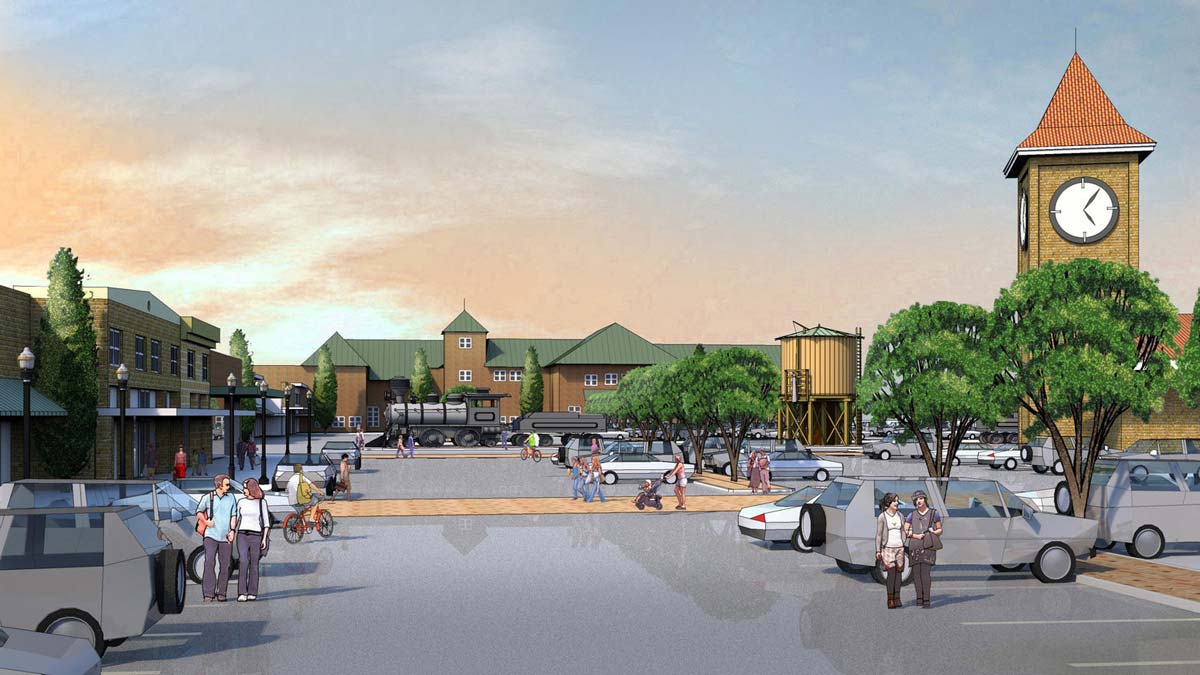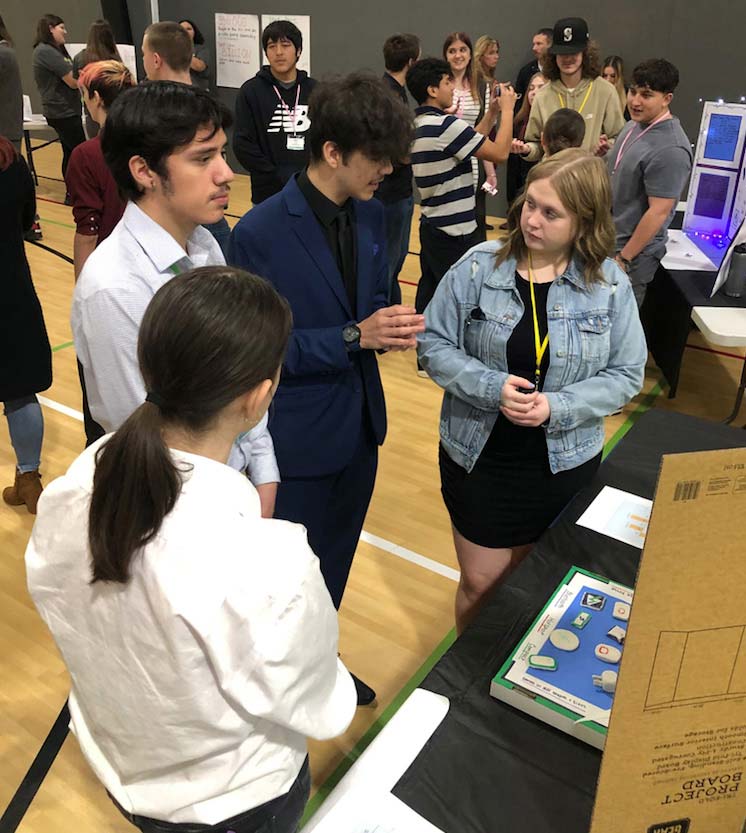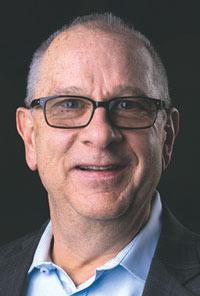Top 10 Business Stories of the Year
From a Winco Coming to Centralia Station to the Closing of Yard Birds, Plenty Happened Business-Wise in 2022
By the Economic Alliance of Lewis County
A Look Back at the Top 10 Biz Stories of 2021
- Lowe’s Opens Winlock Distribution Center
- Taylor’s Purchase The Chronicle
- ToledoTel Plans Broadband Expansion
- Senter Chosen to Lead Port of Chehalis
- Shelton Outfitter Takes Control of Sunbird Shopping Center
- Powersports Northwest Sold to Local Family After Four Decades With Previous Owners
- Packwood Sewer Expansion
- Winlock Electrical Substation Turned on by $3.55M
- Port of Chehalis Closes $2.5M Sale to McCallum Rock Drilling
- Centralia Port Enters $1.6 Million Sale for 7 Acres
Honorable Mentions.
- Ryerson Locates to Centralia
- STIHL Northwest Celebrates Opening of Facility in Port of Centralia
Port of Centralia – An artist’s rendering of Centralia Station, where WinCo is building an 84,000-square-foot grocery store.
1. WinCo to Construct 84,000-Square-Foot Grocery Store at Centralia Station
WinCo Foods announced this summer the company has entered a real estate contract with the Port of Centralia to construct a 84,000-square-feet grocery store.
The project will be located off the Alder Street and Yew Street intersection in Park 3. Also planned at the development are two complementary retail pads for the shopping center. These additional storefronts are a dining establishment and multi-tenant retail shops.
The Port of Centralia Board of Commissioners — Kyle Markstrom, Julie Shaffley and Peter Lahman — weighed in on the project in a joint statement.
“Though it has been a long process, we are beginning to see the light at the end of the tunnel,” the commissioners stated. “The Port of Centralia is excited to see this project taking shape this year, and we believe the community will be excited to see progress as well.
The 24-hour warehouse-style WinCo stores are wide open, well-stocked and known for competitively low prices. In addition to the extensive variety offered in the grocery aisles, produce, deli, bakery and meat/fish departments, every WinCo features a bulk section where customers can buy as much or as little of a product as they want, according to a press release.
The company operates lean and mean through its own distribution, warehouse and transportation network. With its close direct relationships with many farms, producers and vendors, the middle man is removed, allowing WinCo to keep its prices low for its customers.
WinCo Foods is an employee-owned company, meaning every worker has a stake in the business. As long as they have worked the minimum hours in a year, employees receive an annual gift of WinCo stock equivalent to 20% of what they make yearly.
WinCo Foods Vice President of Real Estate Greg Goins said, “We have watched Centralia for many years hoping to find just the right site to serve this dynamic and growing market. We are excited about the Port site and the opportunity to finally serve the Centralia/ Chehalis markets.”
WinCo has a network of stores stretching across 10 states, with more than 21,000 employee owners.
2. Startup Company Zap Energy Holds Fusion Power Presentation at TransAlta plant
In October about 30 officials from the Centralia city government and other local entities attended a presentation hosted by Zap Energy, TransAlta and the Centralia Coal Transition Board to assess the feasibility of putting a Zap Energy fusion pilot plant at the site of the TransAlta Big Hanaford Road gas power plant.
The meeting came as the company is determining whether it can retrofit part of the TransAlta plant. TransAlta is set to shut down its coal-fired operations in 2025 as part of a deal reached with the state well over a decade ago.
Ryan Umstattd, vice president of product for Zap Energy, broke down the details of the fusion process, explaining how in his view it’s different and safer than traditional nuclear energy.
Traditional nuclear energy relies on fission, the process of breaking apart very heavy atoms such as uranium or plutonium to release energy. Fusion relies on breaking apart the lightest atom, hydrogen.
“There’s no long-term radioactive waste. It’s safe in that it’s vastly different from traditional nuclear power plants. There’s no possibility of a runaway reaction,” Umstattd said.
Umstattd added that runaway reactions aren’t a risk because a fusion reaction relies on an outside source of energy to start the reaction and the reaction stops if the power source is removed, as opposed to the dangers of fission, a process in which a chain reaction can set off a runaway reaction resulting in a catastrophic reactor meltdown. With fusion, there is absolutely no possibility of a nuclear meltdown.
He claimed that the electricity created from Zap’s fusion reactors would cost customers between four and six cents per kilowatt-hour (kWh) as the wholesale price. Currently, Centralia citizens pay on average between seven and eight cents per kWh depending whether they’re within city limits or not.
Zap Energy is still only looking into the feasibility of the site and ensuring that the pilot plant will fit in the space available and determining if they can utilize any of the existing infrastructure.
According to Umstattd, if the site is chosen, he expects Zap’s fusion pilot plant to be operational by 2030.
Should Zap Energy actually move ahead with their plans to build the pilot plant here in Centralia, it would be the first fusion plant of its kind.
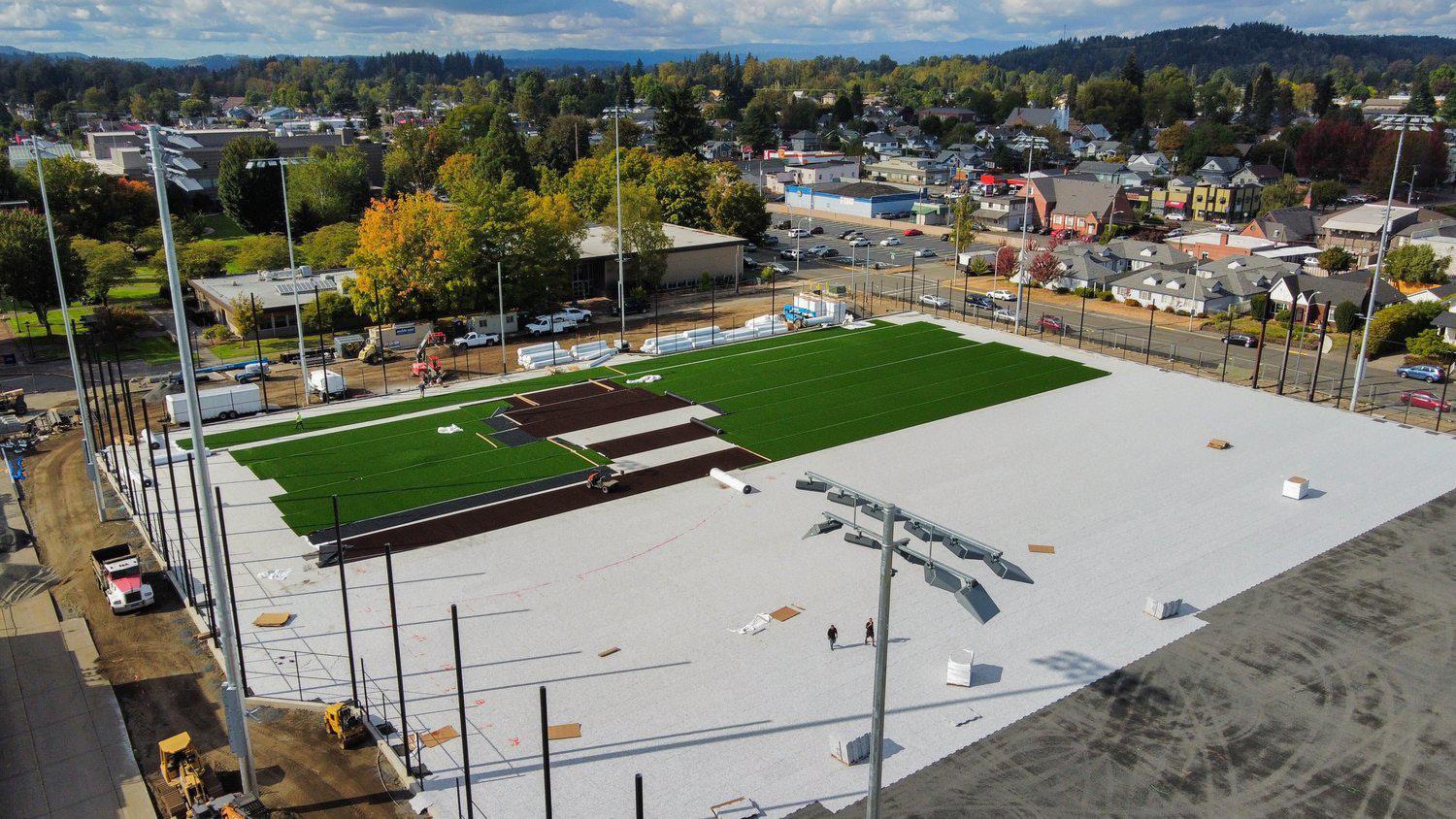
3. Centralia College Continues with Upgrades, Improvements
2022 was a banner year for Centralia College as several milestones were met.
Centralia College is nearing completion of a new on-campus athletic facility for baseball, softball and soccer.
The college entered into a partnership with a private company to build and manage a 112-bed student housing unit that has broken ground at Ash Street and Centralia College Boulevard and will be open for students in the fall of 2023.
The college celebrated 10 years of affordable bachelor’s degrees in Lewis County. Centralia College’s first bachelor’s degree, the bachelor’s in applied management, was first offered in September 2012.
The college launched its fifth bachelor’s degree, the bachelor of applied science in behavioral healthcare. This program trains professionals for the human services field, including social workers, community service managers, substance use disorder professionals, case managers, and more.
The college’s sixth bachelor’s degree, the bachelor of science in computer science, was recently approved by the State Board of Community and Technical Colleges, and Centralia College plans to offer the degree in fall 2023.
4. Southwest Washington Grain Storage Project Will Inject an Estimated $18 M into the Local Economy
Lewis County has a long-time heritage of farming and agriculture, with some farmers being the third or fourth generation to grow in Lewis County. For many years, these local farmers and growers have dealt with flooding and natural disasters, loss of processing facilities, and a lack of infrastructure to support agribusiness.
In response to these issues, regional producers formed the Southwest Washington Growers Cooperative to support agricultural development in Southwest Washington. Today, the Cooperative has 31 active members seeking to increase the viability of family farms through collaborative opportunities. These producers worked closely with Northwest Agriculture Business Center (NABC) and WSU Extension and found that grain, especially malting barley, could serve as a viable crop replacement for both growers and buyers. However, infrastructure was still needed to provide storage and facilitate transporting crops to regional buyers, most of whom require rail transport.
In 2019, the Port of Chehalis and the Cooperative successfully petitioned the Lewis County Commissioners and were awarded $800,000 for the installment of a rail spur on the Port’s property. The rail spur was completed in the spring of 2020 and allowed growers to transload malting barley to Great Western Malting in Vancouver, Washington, that summer.
The first year saw 600 metric tons of barley delivered, followed by 1,400 metric tons in 2021. It’s projected that 2,500 metric tons will be delivered in 2022, produced on approximately 1,000 acres.
The next phase of the Southwest Washington Grain Project began shortly after the completion of the rail spur, with the goal of creating an aggregate storage and rail transload facility alongside the rail spur.
In support of this goal, the Port of Chehalis was awarded $1.75 million through the Washington state Capital Budget in 2020. This funding will allow for the construction of a publicly accessible rail transload facility consisting of upright grain bins and conveyors for loading and unloading grain.
Once completed, the storage and transload facility will allow the region’s grain producers to access regional, national and international markets. The project anticipates generating over $750,000 in producer payments and handling fees in 2022 and injecting an estimated $18 million into the local economy over the next nine years.
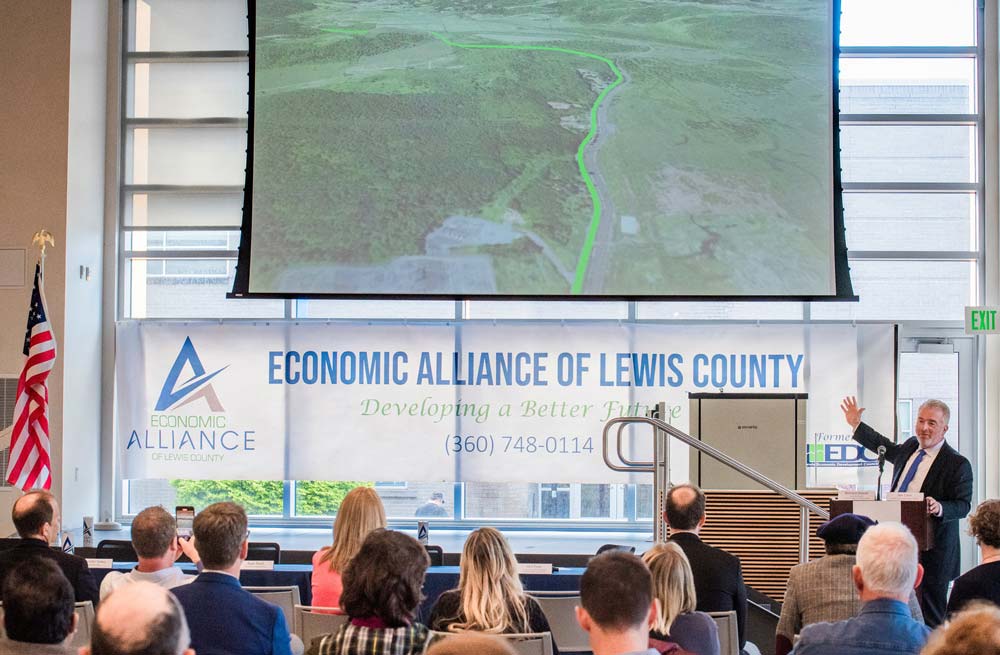
The Chronicle – Paul Browning, CEO of Fortescue Future Industries North America, talks about a proposed hydrogen plant as a presentation is displayed during a meeting in the TransAlta Commons at Centralia College
5. Hydrogen Plant Proposed for Industrial Park at TransAlta
During its first “Hydrogen Symposium,” the Economic Alliance of Lewis County announced in May it was facilitating a partnership between TransAlta and Fortescue Future Industries (FFI) to potentially bring a hydrogen plant to the Centralia area.
If built, the plant would cost between $400 and $600 million and would be at the Industrial Park at TransAlta (IPAT), according to the Economic Alliance of Lewis County. FFI is an Australian company with headquarters in America seeking to use the fossil fuel infrastructure and workforce to create clean energy called green hydrogen.
“With green hydrogen there is no fossil fuel,” said FFI North America CEO Paul Browning.
Browning said in a news conference before the announcement that every morning he wakes up and aspires to combat climate change.
The parent company of FFI is Fortescue Metals Group, which mines iron ore. It is one of the initiatives of FFI to achieve net zero emissions by the year 2030, which Browning called the “most ambitious (energy goal) in the mining industry.”
Richard DeBolt, executive director of the Economic Alliance, said the company has been searching across the world for the ideal place to start a hydrogen plant from the ground up, and that Centralia has the land, water and economic prospects ideal for such an industry.
Browning said the timing of that was perfect because TransAlta will be fully closed in 2025, and the hydrogen plant could be open in 2026.
The FFI plant would bring in about 140 jobs after it is built and around 200 during construction. Executives said the jobs would be standard energy infrastructure construction labor.
The final investment decision on a potential plant would be at least two years out.
“Our goal is to make green hydrogen the largest globally-traded commodity,” Browning said. “We have to.”
6. Ryerson Centralia Center Comes to Port of Centralia
The Ryerson Centralia service center located at 3010 Harrison Ave. finished its construction of its 215,000-square-foot facility in 2022.
Ryerson Centralia employs about 50 to 60 employees initially with possibilities for expansion. Ryerson produces aluminum, stainless steel and carbon steel into plates, sheets, bars and tube products. Ryerson is a leading value-added processor and distributor of industrial metals, with operations in the United States, Canada, Mexico, and China. Founded in 1842, Ryerson has around 3,900 employees in approximately 100 locations.
7. Up to 85 Jobs Possible as Georgia-Pacific Acquires Centralia Property
At the beginning of 2022, Georgia-Pacific announced the acquisition of property in Centralia, as it intends to expand its corrugated packaging operations in the Pacific Northwest.
“Georgia-Pacific’s corrugated business has strong relationships with produce and e-commerce customers, and
a new facility will help us serve these growing customer segments,” said Travis Dawson, vice president of the west region for the corrugated business. “The solid performance of our Olympia plant gives us confidence in the ability to expand business in the region.”
“The Economic Alliance of Lewis County is excited to have Georgia-Pacific expand to our community. They have a long history of collaboration in working to support families in the Pacific Northwest,” said Richard DeBolt, executive director of the Alliance.
In the news release, the company said expansion plans are still in the early stages.
“Once plans are solidified, it is expected a new facility would create about 85 new jobs,” the company wrote.
Based in Atlanta, Georgia‐Pacific is a integrated packaging supplier providing a range of packaging solutions across the U.S., including containerboard, corrugated boxes and sheets, recyclable mailers for e-commerce, high-graphic packaging through our Color-Box® business and digital print for packaging through our Hummingbird® business.
The company’s recycling subsidiary is among the world’s largest traders of paper, metal and plastics, contributing to a paper recovery rate of just over 65 percent and a corrugated recovery rate of about 90 percent in the U.S., according to the company.
8. ToledoTel and County Awarded $23.5M
Also as 2022 dawned, Lewis County and ToledoTel received a large chunk of funding when the Washington State Broadband Office published its list of awardees for Infrastructure Acceleration Grants.
About $23.5 million was awarded to Lewis County and ToledoTel in a public-private partnership that will aim to bring high-speed, fiber-optic internet to more than 1,800 Winlock residents by the end of 2026.
With more than 1,800 broadband subscribers currently, the Winlock project is expected to double ToledoTel’s servicing network and customer base over the next five years. The project will cover 250 miles of fiber construction within the Winlock area.
“Lewis County ranked fifth out of 13 awardees and received the largest maximum award in this round of funding. The proposed project would start this year and wrap up by the end of 2026,” stated a news release from the county.
“Together, Lewis County, ToledoTel and Lewis County PUD have been awarded a little more than $36 million in broadband infrastructure funding and will continue to seek future funding opportunities outlined in the Infrastructure Investment and Jobs Act,” the news release continued.
9. White Pass Ski Area Enjoys Strong Season Under New Ownership
The White Pass Ski Area, located along U.S. Highway 12 on the Yakima/Lewis County borderline, was sold and is under new ownership. The new owners enjoyed significant snowfall and a snow-happy April of 2022, making it one of the best seasons in memory, and reopened this fall as snow blanketed the slopes during Thanksgiving.
The new owners plan to double the size of its mid-mountain lodge while adding more buildings for guest services.
New General Manager Rikki Cooper announced new season pass sales details.
“White Pass is a home away from home for many of you, and we want to make sure that our core customers can continue to purchase a season pass despite growing interest in visiting our gem of a ski area,” she stated in a press release. “I recognize that the increased interest must be balanced so that we do not invite too many people to the party and dilute the quality experience we have come to expect. With these goals in mind, White Pass will be limiting the number of Unlimited Season Passes available.”
She said the resort will no longer exceed the number of guests from the 2021/22 season.
The Chronicle – The iconic Yard Bird nests in its former parking lot.
10. Yard Birds Tenants Evicted, Building’s Future Uncertain
As 2022 neared its end, so did the iconic Yard Birds as it officially closed in early December.
Tenants who had been renting storage space and operating businesses were given until midnight on Nov. 30 to vacate the building.
In a news release, the city of Chehalis announced it closed the building through condemnation due to the ongoing lack of power and other hazards present.
Yard Birds first opened in 1947 when boyhood friends, Bill Jones and Rich Gillingham, started a war surplus in an old garage on the corner of Harrison and Yew in Centralia. They call it Two Yard Birds Surplus with two “Sad Sack” characters as store mascots. They soon moved their enterprise north of the Chehalis city limits, on Highway 99, calling it the “Largest Surplus Store on the West Coast.”
•••
Editor’s Note: The Chronicle contributed to this listing.
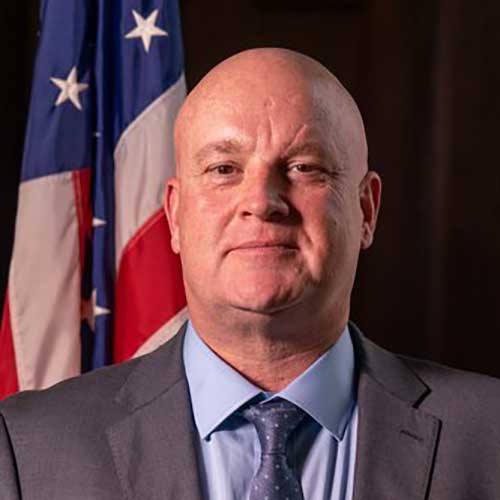
By Scott Brummer
Commissioner Brummer Joins Alliance Board
By the Economic Alliance of Lewis County
Newly-elected Lewis County Commissioner Scott Brummer is also the newest board member of the Economic Alliance of Lewis County.
He has called Lewis County home for the past 28 years, where he and his wife Kristine have raised three children, and now have three grandchildren. He has “a passion about where we live and keeping our small-town values that make Lewis County great,” he said.
For more than 20 years, he served the region as a Washington state Department of Fish and Wildlife habitat biologist. His career with the state focused on solving problems from flooding, bank erosion and sustainable timber harvest.
Brummer has a Bachelor of Science in biology. He has experiences as a farmer, as the owner of a small farm and feed business and as senior pastor of God’s Place church in Ethel. He also has extensive experience with budgets, accounting, finance and regulatory requirements.
He believes as a board member of the Alliance, he will assist in “well-planned growth, housing and job opportunities to provide for our children and grandchildren to build and live right here in Lewis County. We need more flexibility to make local decisions on where and how we grow. I will advocate for that flexibility to keep us moving forward while maintaining the quality of life we have come to love.”
He also believes Lewis County, rich with agriculture and timber resources, is “being impacted with unnecessary and costly regulations.”
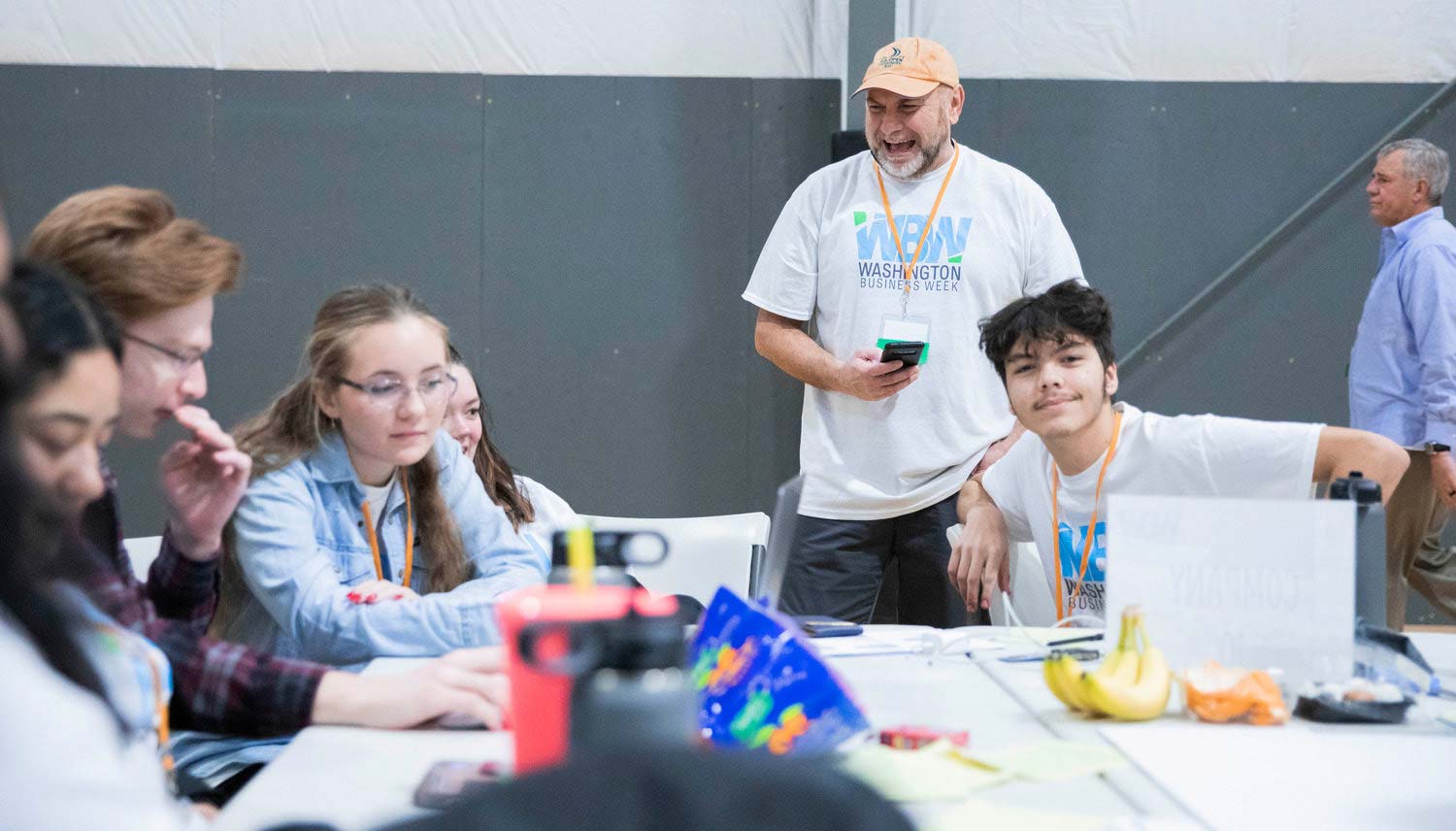
Jared Wenzelburger / The Chronicle – Todd Chaput smiles while working with Centralia High School students during Washington Business Week at the Northwest Sports Hub on Wednesday.
Economic Alliance Sponsors Washington Business Week
By the Economic Alliance of Lewis County
The Economic Alliance of Lewis County closed up shop in mid-December and the entire staff volunteered for the four-day Washington Business Week.
“We wanted to help out,” said Alliance Executive Director Richard DeBolt. “We felt it was an opportunity to invest in the community and the bright economic future led by our youth. It was heartening to see the growth of the students’ confidence throughout the week.”
Todd Chaput, the Alliance’s initiative’s program manager, was all smiles during the gathering.
“The students were really into it and excited,” Chaput said. “It was a real pleasure to be part of Business Week this year.”
Centralia High School juniors presented new products and “investors” spent Monopoly money on the ones they deemed the most profitable.
This was Lewis County’s first Business Week since it was postponed due to COVID complications. This year it was held at the Northwest Sports Hub in Centralia, sponsored by both the Economic Alliance of Lewis County and the Cowlitz Indian Tribe, with hosting duties by the nonprofit Kiddin’ Around.
Dolly Tardiff / Economic Alliance of Lewis County – Centralia High School students discuss projects during Washington Business Week at the Northwest Sports Hub.
Two Years in as Your Executive Director
The Alliance Has Been Blessed with a Solid Economic Base to Work from and Outstanding Partners
By Richard DeBolt
Executive Director – Economic Alliance of Lewis County
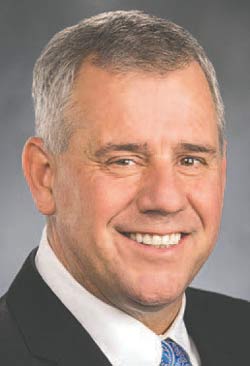
Executive Director – Economic Alliance of Lewis County
When I was given the honor to lead the Economic Alliance of Lewis County two years ago in January of 2021, I was quoted in The Chronicle, “If we do this correctly, I think we can have an opportunity to bring in some businesses.”
I also said, “My goal is to be somebody who helps unify everybody, gets everybody going in the same direction so that we can make sure that we have as much success in this post- COVID economy that we can have.”
As I look back on the past two years, I firmly believe that with the strong Alliance Board and the cooperation of many community partners, we have achieved those two goals, although we press on in what seems like faster and faster efforts to both bring more businesses to Lewis County, and to also fulfill our name change to the Alliance as an organization that builds community.
A look back to my first year in 2021 showed strong growth, from Lowe’s opening its Winlock distribution center to both the ports of Centralia and Chehalis landing substantial tenants and projects.
That momentum continued into 2022 and we have such positive energy coming our way, from the WinCo grocery store coming to Centralia Station to ToledoTel continuing with its expansion to the improvements and advancements at one of our crown jewels — Centralia College.
We also have potential interesting projects in the hopper, including a group that wants to produce fusion power to a proposed hydrogen plant in Lewis County.
As I reflect on the past, I want to thank Ben Kostick, who has been chair of the Alliance during my opening tenure. Ben has been a solid, positive influence on our group.
I also pivot to the future as a new year dawns in just a week. I am proud to state that the Alliance is well positioned to continue bringing the community together and also attracting new businesses and expanding our existing ones.
We have a staff really second to none, with deep knowledge, experience and which shares my goal of bringing us all together for the greater good.
So, with that, Merry Christmas and I truly wish you all a prosperous and happy new year.
•••
Richard DeBolt is the executive director of the Economic Alliance of Lewis County.
BOARD MEMBER SPOTLIGHT
Q: How long have you been a member of the Economic Alliance of Lewis County?
A: About 5 years
Q: Why did you join The Alliance?
A: I joined because the Lewis County PUD needed a voice on the Alliance Board.
Q: What is a key for the success of your business?
A: Customer service. My team realizes that our clients are the heart of our business.
Q: What do you enjoy most about volunteering?
A: Volunteering gives me a feeling of belonging to our community. Supporting fellow volunteers makes our efforts more successful.
Q: What do you love most about your industry?
A: The accounting profession is constantly changing and providing challenges to our firm. Every day brings a new opportunity to help our clients.
Q: How do you define success?
A: Wow, that’s a tough question. To me success is a moving target that I hope I never hit. If I feel I’ve succeeded, what would I have to work for?
Q: Who inspires you?
A: My mother. She endured so many years of me growing up and at 90 I still look to her for guidance.
Q: What is one thing, either industry-related or not, you learned in the last month?
A: The 87,000 IRS employee hiring phase is only talk. About 50,000 will fill positions opening by attrition and the other 37,000 will only staff up to 2015 levels.
Q: What’s the last book you read?
A: “Murder on Embassy Row” by Margaret Truman. Fabulous mystery writer based in Washington, D.C.
Q: What is your favorite meal?
A: A barbecued cheeseburger on a gluten-free bun.
Q: What do you do for pleasure outside of running your business?
A: I’m not good at it but I love to play golf.
Q: What is the favorite car you have ever owned?
A: My Chevy SSR is probably my favorite. I love a convertible.
Q: What is something about you (a fun fact) that not many people know?
A: Hmm. No, I can’t admit that. Hmm. No not that either. How about I competed at the state fair in meal prep — French toast and bacon.
SPONSORED CONTENT
Thurston-Lewis-Mason Central Labor Council
WSLC Uses Power of Unity to Benefit All Workers
BY THE WASHINGTON STATE
LABOR COUNCIL, AFL-CIO
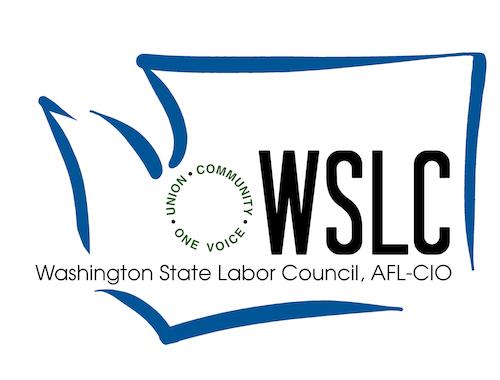
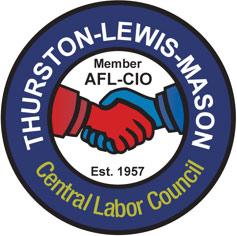
When workers join together in unions, they have more power to negotiate better wages and working conditions than they do as individuals.
“When unions work together, their members can negotiate better contracts, earn more money, and boost our state and local economies,” said WSLC President Larry Brown. “But they also use that power to fight for working standards that benefit everyone. Higher minimum wages, paid sick leave, paid family leave, access to overtime pay—all of these were fought for and won by Washington’s labor movement, but they benefit all workers. That’s the power of collective action and joining together.”
The WSLC also has a number of programs of specific benefit to all workers, including:
Workforce Development—This department advocates for all workers from initial entry into the workforce by promoting apprenticeship opportunities, to career transition when workers need help with retraining, to assisting those facing job loss.
For example, the WSLC Workforce Development helps file petitions for the Trade Adjustment Assistance, a federal program that provides aid to workers who lose their jobs due to offshoring or increased imports. As a result, thousands of workers in Washington state currently have access to TAA benefits like relocation assistance, training/tuition support, extended income support, partial wage replacement for older workers, and more.
Project Help—This WSLC program assists injured workers in Washington with the early and successful resolution of workers’ compensation claims. It provides educational and one-on-one claims assistance to all interested persons. Get details at www.ProjectHelpWA. com.
Learn more about the WSLC at www.wslc.org and get the latest information about Washington’s union movement at the WSLC’s award-winning news service, The Stand, at www.TheStand.org.
PROPERTY SPOTLIGHT
473 North Market – Chehalis – $1.6 million
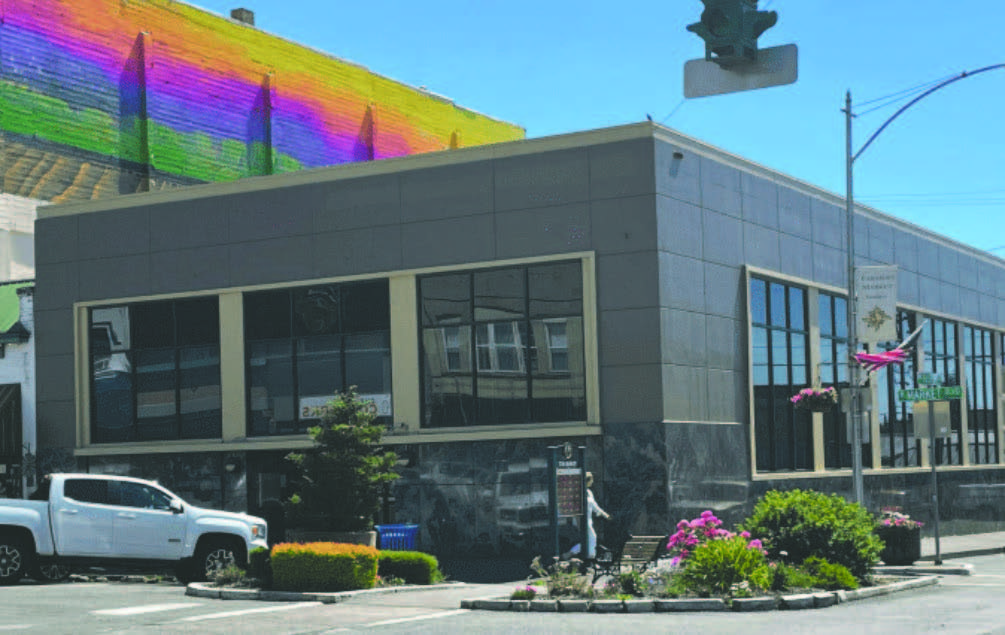
- Land size: 0.14 acres
- Building size: 6,000 SF
- Parking lot and size: 0.26 acres (Approx. 11,200 SF)
- ATM/drive-thru parcel: 0.12 acres (Approx. 5,100 SF)
- Zoning: Central Business District
Features
- Offering includes three separate parcels
- Main entrance fronting N Market Boulevard which is the dominant arterial in downtown Chehalis
- Marble type finishes on the exterior of the building
- Hard corner location for the building
- Parking on all streets fronting the building
- Neighboring businesses are primarily local operations
- Parking lot parcel located within one block of the main branch
- Drive-thru parcel on the corner of NW Pacific Ave. and NW Chehalis Ave.
For information on this property and others available throughout Lewis County (or to list your industrial/commercial property for sale), contact Economic Alliance of Lewis County External Relations Manager Eric Sonnenberg a [email protected] or 208-206-5407

